About Podcasts Pt. 2: The Babbling Era
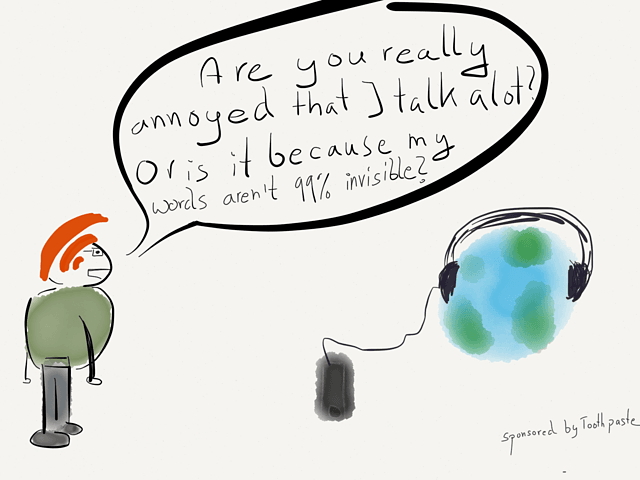
In part one of this mini-series I already hinted at me questioning podcasts for being a useful source of information. My conclusion was that I learned to take them for what they are: slightly more on the entertaining side of things than on the informative.
Before I reached said conclusion I wondered if there was room in my playlist for podcasts at all. I listen to a lot of music and if I’m not, there’s usually an audiobook playing. Committing to podcasts took some time and I wondered how others came to listen to podcasts and if they had things that they don’t like about the shows they subscribed to. So, I talked with friends and browsed the internet. As it turns out, I wasn’t alone in criticizing them and so I decided to collect some of the perceived problems of the medium which I came across in the last years over and over again.
Rather than listing all possible flaws that the shows out on the bit’n’bytes airwaves have, I’ve picked two things where I felt this is something that pushes peoples buttons: shows where the hosts only talk, talk, talk without saying something, and, the lack of quality content in the podcasting landscape. Since this article isn’t a critique, I try to explain from my point of view why these two problems aren’t as bad as they seem.
Disclaimer: This is by no means an academic study, it’s just straight talk on how I perceive things. I apologize to every podcaster who feels insulted by me using the verb “to babble” – just blend out the minor negative connotations it comes with.1 I like it when you chatter/talk freely/feel right at home on the mic, that’s why I felt “babble” was appropriate here.
Preamble: My Listing Stats
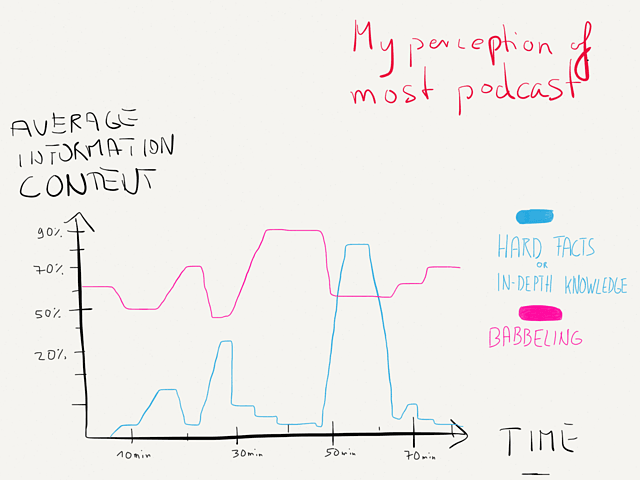
The little graph you see up there is suppose to illustrate my average podcast listening experience; it also represents a cross section of all the shows I listen to. It serves as a starting point to give you an idea of my listening habits.
As you can see, for the most part there isn’t any new knowledge to gain for me while listening – no groundbreaking, nor earth-shattering ideas. On the other side, there’s a lot of babbling – even when in-depth information is conveyed. For me hat’s okay. I listen to podcasts, not the 8 o’clock news on the TV. I take no offense in small talk while I’m tuned it. Truth be told, my personal sweet-spot is 25% informative talk and 75% fun packed discussions. Programs that have the goal to “just inform you” and throw raw data at you aren’t my cup of tea. I want to be entertained and want to feel the chemistry between the people talking into a mic. Otherwise the shows feels dull to me; some more adjectives that jump into my mind are cold, monotonous, boring and artificial.
Being Okay With Chatter OR Why A Podcast Isn’t A Written Article
Stepping away from how I personally feel about the matter of chatting when on air, it seems that for a significant amount of listeners this is one major point of criticism. When it comes to podcasts people tend to dislike the fact that their beloved show hosts tend to babble on endlessly. The ratio of words to information seems slightly off when compared with a blog post.
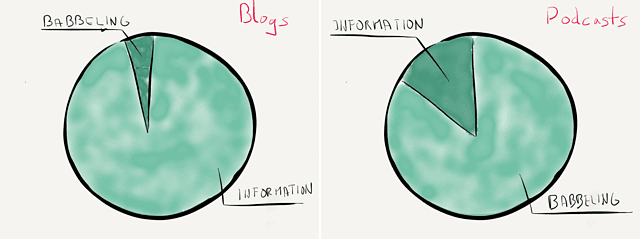
When you look closer, a written article needs “the babbling” only to add some emotions and feelings to a story.2 Whereas when it comes to podcasts this ratio is build by design, so to speak. It’s the heart and soul of a podcast that you can integrate all those unnecessary information and more details for which there would be no room in a generic blog post. For me it’s the ideal medium to show your personality in a more intimate setting and to ask and answer more random question questions.
Personally, I go even further and grant every show host out there the permission to get side-tracked. I don’t take issue if you jump from topic A to topic B at any point in time. After all this happens in a real, organic conversion, too. Lastly, I also like to think that this ratio is an advantage for the listener since one doesn’t need to be in high-focus mode all times.
So, yes: in the case of babbling 99% of the podcasts out there are guilty in my opinion – the big “but”: for me this is totally fine and dandy.
How To Build A Doomsday Device
I’m part of a small German podcast (Der Übercast), and some of our listeners were wondering why we don’t talk more about the automation stuff that they find on our blogs. This section is about why talking voices shouldn’t read out a manual and why letters on a screen are the better choice when planning to teach people how to use heavy machinery.
With podcasts you have a medium that is born to take another approach than you would normally do as in a written article.
On the one hand, no one will crucify you if you talk about a Apple rumor. Quick tips fit right in, whilst they often feel too insignificant for a blog post3. On the other hand explaining complex scripts, macros or advanced power user stuff doesn’t fit the medium most times.

Imagine reading out an instruction on how to build a Farnsworthian doomsday device:
- Step 1: Lock the double-woven alpha string cable in place - use the middle inter-pulsation post.
- Step 2: Check for signs of oxidation after sending 2 Gigawatts through the assembled granulator.
- Step 3: If any errors occurred in step one or two you should feel a breeze of fresh air on what’s left of your skin – the side walls of the building you’re in are removed which causes air-streams of entering your lab. If not, proceed to attaching the ray gun hoisting bracket.
- Step 4: …
- … …
- Step 132: …
It would be way easier the read the 132 steps in the manual. By following the instructions which are accompanied with some illustrations (like in this written article) you can be sure not to blow the roof off while building your shell script Spheroboom 3000™. You will end up having a death bringing, earth shaking doomsday device that will make mankind quiver in no time.

As you can tell by now, despite being pro-babbling following these kind of explanations on a podcast, for instance when someone talks about a (complex) Hazel rule just makes me feel dizzy. My head will start spinning and steam comes out of my ears. In the best case I won’t turn off the volume and just sit it out until the monologue is over thinking “yeah, whatever”.

More Excuses For Babbling
Surely you know about the major advantage of podcasts. In comparison to their inked twin, the blog post they excel at being consumable anywhere. With written content you most likely need to sit down, focus and just read. Unlike podcasts, where you can listen to a show while on commute, working out or do your actual work – it doesn’t matter. You can even do the dishes while listening to Doing the Dishes with Rafferty Thompson.
On a side note, when compared to classic radio programs, podcasts are still more informative and interesting (to me). It’s no wonder since it’s a on-demand system. You pick the show instead of being at the mercy of your radio dial, you can also choose to listen to it whenever you like instead of waiting for it. Then again, I was never big fan of radio.4
Another thing where I’m quite open is how the hosts approach their agenda. I don’t really care if the show follows a strict plan of action or if the hosts have only a rough outline to work with. Admitted, as a listener, nine times out of ten you can tell if they read out what information they’ve gathered on the topic or if they are winging it. Im any case, if the result is still enjoyable, who cares? Of course some show formats demand a more focussed discussion. I won’t argue with that. But, if it’s not an in-depth workflow episode or one that examines a single topic across the full length of the show, there should be no harm in any sort of diversion.
There you have it. I like it when people are just being themselves on the air and talk with each other like friends do.
The Dichotomy
There’s one exception to my preferred 3:1 talk-vs-content ratio: infotainment podcasts. I struggle to find a better wording for them. You might know them as narrative podcasts or as Radiotopia puts it “story-driven shows”. However, simply put, I refer to those shows that flip my ratio and offer me 75% information and 25% fun. Since they are so special, let’s talk about them now.
Since many things are being published under the label podcast nowadays, people confusing online radio with podcasts. To be honest, there are no true borders and both formats peacefully co-exist using the same underline framework, namely RSS.5 So, this dichotomy I speak of is basically just in my mind. It’s just a matter of terminology, some people put it all under one roof, some (me) do not.
Nonetheless I find it important to differentiate between different podcast formats. On the one side we have “supported shows” with sponsors, companies, funds or celebrities behind them. The Daily Dot has an article about “Podspotting: Where to start with the podcast networks” which sheds some light on the people behind the most successful podcasting networks in 2012. In their list all networks have some more or less famous persons from the traditional media industry on-board. Hence they had experience, a fan-base, funds, experts, helpers and more right from the start. On the other side there are the “regular podcasts” which don’t have professional audio equipment, no budget behind them and being run mostly as a fun side project with no business plan at all.
You can take a look at the iTunes charts to see which shows are more successful or you can look at my iceberg below. They both give you the same picture. Content-wise it’s a mixed bag, some traditional shows, some narrated shows, plain news or discussions. Diversity is good.
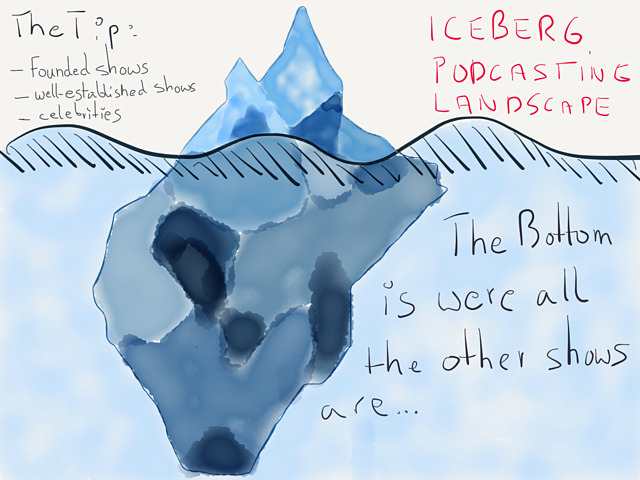
Narrative Podcasts VS. Regular Podcasts
As with most things, often we don’t really know or care about what happens behind the scenes. For instance I still use Google from time to time because they deliver better results. Equally I don’t really care if a show is sponsored or not. What matters in the end is the quality of the content. But as not every search engine can be as good as Google Search, not every podcast can fit under the roof of a network… and for certain not every podcast can produce a high quality story-driven show. The latter is what I wan to focus on here.
I’ve heard from many avid podcast listeners that although they love the shows they are subscribed to, they often wished for a better narrative, little stories that are complete in themselves and if possible a soundscape for more atmosphere while listening. They heard some BBC shows and “99% Invisible - A tiny radio show about design with Roman Mars”, and now they wonder why not every podcaster out there amps up his game and delivers such a stellar product. Some of my friends even went so far an condemned all shows which don’t follow the story-driven model to be of low(er) quality (content-wise). A hardliner statement for sure. For me those two - traditional podcasts and narrative ones - are completely different beasts… hence the dichotomy headline, hence radio versus podcasting enthusiasts, supported versus the average Joe.
♪♫♪♫ Analogy
Regarding accusation of traditional podcasts automatically being of poorer quality when compared to a narrative show I can say “yes, those shows are darn nice and I’m also a big fan”. But, I can’t and will not compare them with regular podcasts. I’m the same with music. I can enjoy crappy recorded songs the same way I love listening to high-end studio productions.
This (↑) is “guy”, he has Tourette’s syndrome and Asperger’s. The song was performed live in a small pub and was recorded on an iPod. To top it guy didn’t have a working monitoring system and more or less improvised the whole thing. If you listened to it you will agree that the quality isn’t great.
Guess what? As hollow as it sounds, I feel his song. For me it’s one of the greatest songs this year and I can listen to it on repeat. Same goes for Jai Paul and his unmastered leaked album ( – it features overload distortion, songs not being panned out, etc…. The leaked version got it all (but it’s better than waiting three years for an album that might not be released at all)).
If I were asked to compare those songs to Kanye West’s $3 million recording of “My Beautiful Dark Twisted Fantasy” I most definitely could… but there would be no point in doing so. Music is created to be enjoyed; period.6
The Backend Of A Story-Driven Podcasts
There’s this argument floating around that podcasters do what they do because they are in it for the fun (and yeah… it’s great when people actually listen to what you do and like it).
German blogger Niels Kobschätzki (@Niels_K) wrote a nice critique about the German podcasting landscape. In short, Niels wishes for more story-driven shows in Germany. I hear his plea loud and clear, but I honestly think we’re so far behind the United States when it comes to podcasting, that our infrastructure just isn’t there yet.
Niels’ point is that exactly this doesn’t matter, since even people on a budget who are podcasting just for fun can follow his simple plan B: small teams could share the workload. One person is the researcher, another would prepare the material whilst the third could be the one in the limelight telling the story. Whilst money from sponsorships would make justifying the additional effort easier, he argues that it could be done without it.
I think Niels is right. Why don’t we all go the extra mile? It’s such a good question and I tried to answer it for myself. Here are my thoughts on the topic:
- I don’t talk much about tech and geeky stuff with my handful of real life friends. It’s nice to have at least one outlet to go geeky. Thank you podcasting, don’t take that away from me.
- I would have a hard time stepping back and working in the background. Somehow I also feel that it’s me who needs to address certain points and to bring forward my own arguments on the agenda. After all it’s my specific point of view and we are not Borg on Der Ubercast. I also wouldn’t be satisfied being just a ghostwriter.
- At least for our little project, there would need to be a separate podcast. Rewriting and editing an existing podcast, e.g. making what I say on the show fit into a narrative isn’t going to work. I’m intrigued by such a project and I’ve already gathered ideas in a file, but when and if it sees the light of day is unclear.
- Barney Stinson deems all girls which are more crazy than they’re hot undateable. Initially I spend way over 8 hours on writing the show notes, that’s also the reason why I made a similar graph for podcasting.7
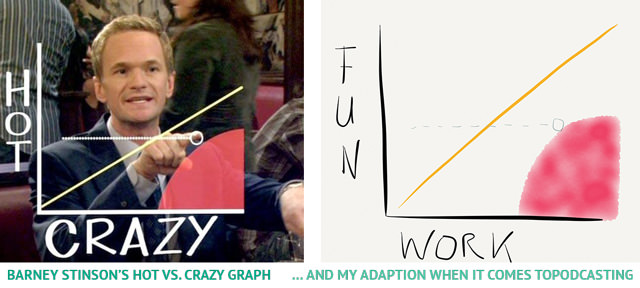
Aside from my personal “issues” there needs to be manpower. Not only the one who does the research and writes the narrative, you also need a composer who produces the score, a dedicated audio engineer who is capable of making a good mix (or at least someone who knows what knobs on a mixer you have to dial in what direction) and in Germany some kind of lawyer who takes care of legal issues. We are unfortunate enough in that we can’t just play music or excerpts from TV shows… even tiny bits of samples without making ourselves liable to prosecution. Paying royalties is a huge process, getting a written consent if you want to play a brief excerpt out of a public radio or talk show is another adventure that can take hours, days, weeks or even months.
In short, it’s not that easy. You got to put more time aside, especially if you’re doing it as one person like Mike Hurley did with his excellent Behind the App series for his Inquisitive podcast. More specialists help, but doing such a thing, even with three people on a weekly basis is just not something you could “do well” as a hobby (see the B. Stinson graph). It would be hard to maintain the quality over each show.
In the end infotainment podcasts are a different beast, content and workload-wise. I imagine it’s infinitely easier if you work with one of the podcasting companies out there, but with enough dedication it can be done without them.
Speaking for myself I can say that I can enjoy both types, be it a story-driven podcast or a regular podcast where the hosts tend to babble a bit here and there. The quality is as diverse as the podcasting landscape itself, but if I like the hosts and the content is well-balanced, then I’m satisfied.
Last Words
I’m aware that there’s definitely more to say about the topic. I haven’t even scratched the surface of what’s possible with podcasts and what’s already out there. For instance music labels using it to release mixtapes (Stones Throw Podcast), TV Shows provided accompanying material, short stories, books and much more. But like stated initially, the scope was just to say my opinion about two problems. So, if you’re raging about the unfocused host you’re listening to, just take a deep relaxing breath and enjoy the human rollercoaster ride.
-
Side note: I grew up in the middle of Germany (Hessen – the state where Frankfurt is located in); we use the same verb there (“babbel”)… so I have zero negative connotations… quite the contrary (More on the Etymology). ↩
-
Or… English isn’t your native language and you have a hard time editing your writing to write as concise and efficient as John Gruber does on Daring Fireball. ↩
-
I love them, but have a hard time to justify publishing them myself… I don’t know why… it’s probably just me being silly. ↩
-
… But I used to follow some shows in my youth: “Hi kids”, back in the days we used to sit in front of a cassette deck with a blank tape inside, our fingers hovering over the rec and pause button just to make mixtapes out of the best songs playing in our favorite radio show. Glory days. ↩
-
When I my introduce podcasts to people unfamiliar with the term, I also refer to them as internet radio to get the point across for brevity’s sake. ↩
-
I like listening to all three artists mentioned above, they are all good, but oh so different from start to finish. It’s also why I don’t get music magazines and album reviews. I tend to find them superficial. Ask 10 people and each one will highlight something different, be it just a sample or riff that triggers childhood memories. Maybe it’s because music is my first love. I’m more open when people discuss movies, food or design. But whatever… one of my weaknesses/strengths is that I manage to find enough good or bad, no matter the topic. If I think something through ninety-nine times out of one-hundred I do a full circle. On every degree mark there are enough pros and cons to do both sides of the story justice. ↩
-
Another arbitrary comparison, but… podcasts are better than selfies. They are more than just an audio-representation of a mugshot. There’s more work and fun involved (… whereat my girlfriend reminded me that putting on make-up and finding the perfect selfie pose might take some time, too). ↩